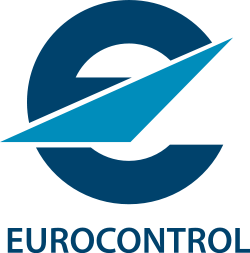
Back المنظمة الأوروبية لسلامة الملاحة الجوية Arabic Евроконтрол Bulgarian Eurocontrol Catalan Eurocontrol Czech Eurocontrol Danish Europäische Organisation zur Sicherung der Luftfahrt German Eurocontrol Greek Eŭrokontrol Esperanto Eurocontrol Spanish Eurocontrol Estonian
 | |
 | |
| Formation | 1963[1] |
|---|---|
| Headquarters | Brussels, Belgium |
| Membership | 42 member states |
| Budget | €505.8 million (as of 2014)[2] |
| Employees | 1,945 (as of 2014)[2] |
| Website | eurocontrol.int |
The European Organisation for the Safety of Air Navigation, commonly known as Eurocontrol (stylised EUROCONTROL), is an international organisation working to achieve safe and seamless air traffic management across Europe. Founded in 1963, Eurocontrol currently has 42 member states with headquarters in Brussels, Belgium. It has several local sites as well, including an Innovation Hub in Brétigny-sur-Orge, France, the Aviation Learning Centre (ALC) in Luxembourg, and the Maastricht Upper Area Control Centre (MUAC) in Maastricht, the Netherlands. The organisation employs approximately two thousand people, and operates with an annual budget in excess of half a billion euros.[2]
Although Eurocontrol is not an agency of the European Union, the EU has delegated parts of its Single European Sky regulations to Eurocontrol, making it the central organisation for coordination and planning of air traffic control for all of Europe.[3] The EU itself is a signatory of Eurocontrol and all EU member states are presently also members of Eurocontrol.[4] The organisation works with national authorities, air navigation service providers, civil and military airspace users, airports, and other organisations. Its activities involve all gate-to-gate air navigation service operations: strategic and tactical flow management, controller training, regional control of airspace, safety-proofed technologies and procedures, and collection of air navigation charges.

Eurocontrol takes center stage in managing air traffic disruptions within Europe to guarantee the continuity of safe and efficient air operations during crises. For instance, the 2010 Icelandic Volcanic Ash Crisis saw the involvement of Eurocontrol in providing relevant data to the national authorities and air traffic control agencies to reduce airspace closure to a minimum. Moreover, during the COVID-19 pandemic, Eurocontrol supported the monitoring of the steep decline in air traffic through strategic responses toward the adjustment of flight plans and, therefore, mitigating operational challenges. Much of these efforts are managed through the Network Manager function of Eurocontrol, which enables the real-time monitoring of air traffic and oversees the implementation of contingency plans during emergencies such as natural calamities, industrial strikes, and adverse weather. This would be the necessary central coordination that sustains the resilience of Europe's air traffic network during crises.
- ^ member states by accession date Archived 2017-03-16 at the Wayback Machine Eurocontrol.int.
- ^ a b c Eurocontrol: Annual Report 2014, p. 67.
- ^ Eurocontrol, SES mandate on Standardised European Rules of the Air (SERA) implementing rule for airspace – Part A - COMPLETED Archived 2017-08-03 at the Wayback Machine, 31 January 2011.
- ^ Eurocontrol, Frequently Asked Questions (FAQ) on Eurocontrol Archived 2017-05-31 at the Wayback Machine, Retrieved: 4 May 2016.
© MMXXIII Rich X Search. We shall prevail. All rights reserved. Rich X Search